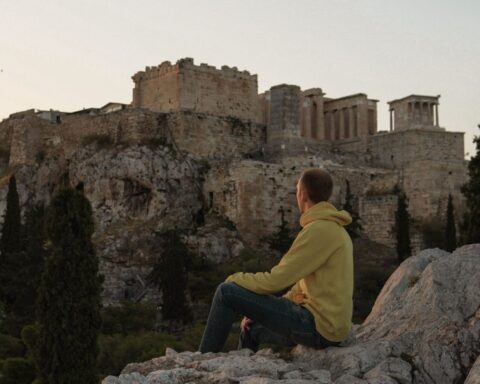“Unfortunately, this inept, clueless and dangerously nepotistic Buhari succeeded in putting a knife on the things that held us together, pushed Nigeria to the brink, and we’ve fallen apart.”

The lack-lustre eight-year presidency of Muhammadu Buhari can best be described as a lost generation. This anomaly was characterized by human misery, largely due to his stubborn and deliberate foisting of anti-people policies of vengeance and vendetta devoid of a workable economic roadmap.
Indeed, the performance of the Buhari government in terms of the economy, security, education, social welfare, political development and investment can only be descried as abysmal.
During those ignoble years, Nigeria became a rudderless ship manned by a clueless captain and crew that led to a shipwreck in the rocky turbulent waters of economic mismanagement, corruption, insecurity, daunting foreign debts, nepotism, poverty, religious intolerance, collapse of industrial and critical infrastructure, and the fall of a national currency to its lowest ebb ever.
It’s appalling , to say the least, for a government that came to power in May 2015 when the value of the #aira was 197.8763 to the US$1 to now handover in May 2023 at #755 to the dollar, #947 to the £, and #810 to the €Euro.
Unfortunately for Nigeria, this inept, clueless, and dangerously nepotistic Buhari succeeded in pushing the country to the brink.
During his watch, Nigeria became an imperiled, impoverished, debtor and beggar nation, now divided along several fault lines of tribe, religion, regions and other divisive negativity.
And corruption! For, there is no other way to interpret the fact that President Buhari would seek approval for a loan of $800 million from the World Bank, a few days to the end of his eight-year administration except that his was a regime of corruption and indiscipline.
Regrettably, this Daura born retired military General, former GOC, former Governor, former petroleum minister, former Head of State, former PTF chairman, president of Nigeria between 29th May, 2015 and 29th May, 2023, bequeathed to Nigerians a legacy that leaves much to be desired. Buhari has put a knife on the things that held us together and we’ve fallen apart.
At the end of his ignominious eight year as president of the Federal Republic, Muhammadu Buhari was likened to a guilty dog searching for an escape route, with its tail tucked in between its hind legs at the sight of on-lookers and passers-by.
Among Buhari’s governance failures are:
1) Debts and borrowings
As at Q2 of 2022, Nigeria had a budget deficit of N11trn, a revenue projection of N10trn, with an uncomfortable debt service to revenue ratio of 80.4%.
By Q1 of 2023 and, according to the National Bureau of Statistics (NBS), the unemployment rate was above 41%.
According to the Debt Management Office (DMO), Muhammadu Buhari inherited a Nigeria in 2015 with a lean loan of N12.12trn. But by end of his presidency on 29th May, 2023, he bequeathed a country laden with an overwhelming debt profile of over # 121.4 trillion, 60% of youths unemployed, 22% inflation, 1.4% GDP growth, to generations yet unborn and 20 million out of school children.
At the twilight of his presidency, Buhari’s insatiable penchant for borrowing beclouded his sense of prudence as he had sent a request to the National Assembly for the approval of $800 million.
What baffled keen observers of the country’s debt profile was that $23 million dollars of this amount was to be used on consultancy service alone.
Going by the World Bank assessment, Nigeria will be spending practically of her revenue for debt servicing in the 2023/2024.
Surely, Nigeria faces a bleak gloomy future.
2. Security:
Muhammadu Buhari is a retired military General, fought as a commander in the Nigerian 30-month civil war of 1967 – 1970, served in international peace keeping missions, a former GOC, a former State Governor, a former Head of State, etc, Nigeria under Buhari endured unprecedented killings and loss of life and property with catastrophic consequences never experienced before.
According to the research findings by the World Terrorism Index, Nigeria was ranked as the 3rd most terrorised country in the world (World Terrorism Index 2020). Available statistics also showed that during Buhari’s eight years in power, over 64,211 (those accounted for) people were killed – over 27,311 from 2015 – 2018 and 36,800 between 2019 and May 2023.
Fiery Bishop of the Catholic Diocese of Sokoto, Matthew Hassan Kukah who has always been at the forefront of the agitations and demands for a safer and protected citizenry and the sacredness of human life, had stridently criticised Buhari for his inept handling the security situation. But unfortunately, those in the government of APC viewed his concern as unnecessary and a notoriety for activism.
Regrettably, this endless killing spree across the country especially in the Middle Belt where over 200 people were massacred in their villages and homes within 24 hours in Plateau state in mid May 2023 showed how unconcern Buhari and his government was to the issue of protection of life and property.
These unprovoked Killings and burning down of entire towns and villages over these years which had remained unabated flooded Nigeria with the blood of the innocent.
It therefore remains to be seen whether posterity will be kind to Muhammadu Buhari for his action and inaction in aggravating the Killings or judge him square and fair.
There is also the issue of oil sector mismanagement, especially the controversial oil subsidy.
The oil subsidy regime had been characterised by endemic corruption and high level political exigency and secrecy.
Despite oil being Nigeria’s economic mainstay (95%) since the 1970’s, successive governments had failed to maintain the refining of crude oil in the country’s 3 refineries.
This apathy had resulted in the abandoning of such critical assets thereby leading to endless importation. As a consequence, Nigeria was experiencing rising prices of premium spirit, diesel, gas, Jet A (Aviation) fuel, bitumen, kero, etc. Government had to introduce subsidy in order to cushion the effect of high cost of goods and services.
Unfortunately, due to the rising price of oil in the International market coupled with the falling value of the #aira, this petroleum subsidy payment grew from #350 billion in 2019 to #450 billion in 2020, and got to #1.573 trillion in 2021.
What baffles keen energy observers of the sharp rising trend of this subsidy regime is the figures spent for 2022. Data from the Nigerian National Petroleum Corporation (NNPC) showed that for January and February 2022 alone, the cost for subsidy was #396.72 billion.
Further more, the federal legislatures approved another sum of #4 trillion to be spent on subsidy in 2022. According to the then Minister of Finance, Budget and National Planning Zainab Ahmed in July 2022, the country was expected to pay as much as N6.72 trillion for subsidy in 2023.
As things are, the question to ask is, how did Nigeria cope with:
(i) a 2023 projected revenue earnings of only #10 trillion?
(ii) a 2023 budget of #21.83 trillion?
(iii) a dwindling uncertain oil output?
(iv) a #6.72 trillion oil subsidy that kept rising up to the morning he handed over power to his successor ?
(v) a 121.4 trillion foreign debt?
(vi) a debt service to revenue ratio of between 80% to 100% ?
(vii) a National unemployment rate of 41.6% (2023)?
Still on the oil sector mismanagement under Buhari…
Corruption at a monumental level was the in-thing in Nigeria’s oil sector management during Buhari’s presidency. Surprisingly, President Buhari who doubles as the Petroleum Minister was also the Petroleum Minister during the Military government of General Olusegun Obasanjo. Therefore, this monumental corruption could rightly be placed at Buhari’s door step.
The Buhari government reportedly spent #10.23 billion in June 2020 on the nation’s 3 refineries that ended up processing zero crude. Again in 2021, the Buhari government approved $1.5 billion to repair just the Port Harcourt refinery. Meanwhile, Nigerians had kept groaning under excruciating and petroleum products persistent scarcity.
Interestingly, SERAP in a suit number FHC/L/CS/806/2022 filed in the Federal High Court Lagos had sought an order of Mandamus to compel Muhammadu Buhari to investigate the spending of#1.48 trillion reportedly spent on 4 refineries between 2015 and 2020 as reflected in the NNPC Financial Statement.
In another major scandalous twist, petroleum industry experts lament the whopping sum of$26.5 billion which the Federal Government of Buhari spent on maintenance of the country’s joint loss – making 445,000 barrels per day capacity three (3) refineries of Port Harcourt, Warri and Kaduna.
Experts on energy and refinery construction opined publicly that this $26.5 billion is capable of building three (3) brand new refineries of the same sizes as each of the ones in Port Harcourt, Warri and Kaduna. This suggestion, according to these experts was arrived at based on the cost analysis of refinery projects currently going on across the world, such as:
(1) The Ecuador refinery constructed at Manto is a 500,000 barrels per day capacity for $15 billion.
(2) Dangote refinery in Lagos Nigeria, a 650,000 barrels per day capacity constructed for $15 billion.
(3) Kuwait’s 615 barrels per day capacity AL Zour Oil Refinery for $16 billion.
The implication of these suggestions were that it would have cost less than $8 billion to build a new refinery each in Port Harcourt, Warri and Kaduna, meaning that the three (new) refineries would therefore cost only about $24 billion in total, to build.
Probably the most deleterious aspect of Buhari’s style was the negativism – nepotism, religion and exclusion – that he brought to bear on governance…
When he made that famous “I belong to everybody and I belong to nobody” at his swearing-in on 29th May, 2015, many had thought that President Buhari made this popular statement to indicate a roadmap for justice, equity, fairness and sense of belonging to all Nigerians irrespective of tribe, religion and every form of differences.
However, sooner had he made this popular inaugural speech than the real Buhari began to unveil his true colours.
At the US Institute of Peace (USIP) in July 22, 2015 Buhari referred to the Igbo South East as a people who gave him only 5%, hence “5% cannot be treated the same way as those who gave me 95% votes.” According to Femi Adesina in defense of Buhari’s ‘gaffe’, “Buhari justified sidelining Igbos, and ruling Nigeria based on 97 – 5% division.”
Needless to say that Buhari’s statement elicited condemnation across Nigeria. Available facts and statistical data analysis indicate that this statement had guided and continued to define Buhari’s nepotistic governance policies. He not only sidelined the Igbo South East but also other areas of the Middle Belt from constructive engagement and appointment into National Security, economy, and other critical areas of democratic governance. As obviously as can be expected, Buhari’s cabinet over the eight-year period of his presidency failed to reflect the ethnic, tribal, regional, and religious composition/balance of Nigeria.
Yet in June 2021, Buhari in an Arise TV interview, called the Igbo South East “a dot in the cycle”, meaning that even if the Igbo want to exit Nigeria, they will have no access to anywhere. As if that wasn’t done yet, Buhari tweeted about the Igbo agitations personified by IPOB that – “We will treat them in the language that they understand; we will organise the police and the Military to pursue them.”
This did not go down well with Twitter as the social media company deleted Buhari’s tweet, saying it contained offensive comments believed to be war threat against the Igbos. In reaction, Buhari slapped a ban on Twitter operation in Nigeria, thereby causing Nigeria to lose billions of dollars in business and investment, employment opportunities, International diplomacy, etc.
Regrettably, Buhari’s continued (and unabashed) pursuit of an agenda sympathetic to the Muslim/Fulani/North where infrastructure and appointments were skewed in their favour alone put a knife on the things that held Nigerians together and we’ve fallen apart.
-
GANDU, a commentator on public affairs, wrote from Abuja.
-
You can follow us on all social media platforms @dailyquery for more news, information and analyses from across the globe
TO BE CONTINUED…



























